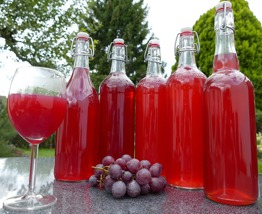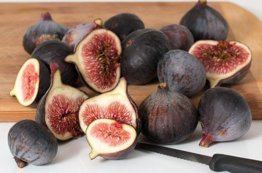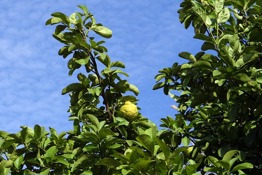Kedushat shevi'it in the kitchen

This article is an abbreviated version of the halachic rulings of Torah VeHa'aretz Institute, taken from the book Katif Shevi'it and from the new English version of The Consumer's Guide to Shemitah.
Eating produce with kedushat shevi'it, shemitah sanctity, is a special mitzvah (according to many opinions), aside from the merit of eating produce infused with the sanctity of the Land of Israel. Due to this special status, the Torah commands us to protect the sanctity of produce from the shemitah year.
Fruits and vegetables with kedushat shevi'it reach our kitchen table in two ways:
- Vegetables picked from the home garden or from areas declared ownerless and fruit from trees that began growing during the shemitah
- Fruits and vegetables purchased from otzar beit din.
Kedushat shevi'it times
Vegetables - Whatever is harvested after Rosh Hashanah of the shemitah year has kedushat shevi'it.
Fruit - Fruit that begins growing after Rosh Hashanah; that is, the first fruits that have kedushat shevi'it will ripen in mid-winter.
There is kedushat shevi'it in fruits, vegetables, herbs, etrogim, and plants used for cosmetics.
Kedushat shevi'it is present in the produce itself and also in all of the foods that include ingredients with kedushat shevi'it. For example: salad dressed with kedushat shevi'it oil should be handled as having kedushat shevi'it. If even one kedushat shevi'it vegetable is in a soup, the entire soup is infused with kedushat shevi'it.
Handling kedushat shevi'it produce
Food processing
It is permissible to process kedushat shevi'it produce in conventional ways only. However, such produce should not be processed in unusual ways; for instance: grating a cantaloupe, squeezing an eggplant, cooking a watermelon, mashing a cucumber, peeling an apricot, etc. Even if the food was processed in an unconventional manner, it is nonetheless permitted to eat.
It is permissible to eat shemitah produce in any regular, conventional manner, even if some of the food might be wasted or spoiled (hefsed). For instance: it is permissible to eat half-an-apple even though some will be spoiled (and it is even permitted to feed a kedushat shevi'it banana to a baby, even though he will most likely not finish it, and will even fling mashed banana all over the kitchen floor). When possible, it is best to finish the entire fruit or vegetable, to avoid hefsed.
Leftovers with kedushat shevi'it and the pach shevi'it
Small, insignificant scraps that people generally throw away (bits of leftover salad or soup, peels, pits, a drop of grape juice in a cup) can be discarded in a regular garbage can. It is also permissible to wash the small bit of food stuck to the walls of the pot, the cutting board, grater, etc.
Food that is inedible to humans does not have kedushat shevi'it.
A significant amount of leftovers (half a plate of food that was uneaten, a significant amount of food left in a pot, half-an-apple) all have kedushah and should be handled as specified below.
Many posekim maintain that orange peels have kedushat shevi'it since they are often candied. Also, peels that many people eat should be handled as having kedushat shevi'it, even if your family peels them, such as cucumbers and apples.
Handling kedushat shevi'it leftovers
Place the leftovers in a receptacle (pach shevi'it or shemitah bin), until no longer edible to humans. If the food is cooked, after two days it can be discarded in the regular garbage bin. If raw, wait a week until adding it to the regular garbage. It is important to be careful when adding new leftovers to the pach shevi'it: if Tuesday's scraps touch Monday's scraps, it will accelerate the new scraps' rate of spoilage. For this reason, either (1) place each day's leftovers in a separate bag or (2) separate each day's scraps with newspaper or paper. It is best to prepare a wide, shallow bin and place each day's scraps side by side and not on top of one another.
Liquid leftovers (soup and the like) can be left uncovered outside of the refrigerator for the duration of the night. By morning, it no longer has kedushah and can be poured into the sink.
In cases where it is impossible to save scraps until they rot (such as in public kitchens), we can be lenient: double wrap or bag leftovers in plastic and discard them in the regular garbage can.
It is a good idea to position your pach shevi'it in a prominent place in the kitchen raise the awareness of each family member and help them internalize the merit of eating kedushat shevi'it produce.
We also recommend making a list each week of the fruits and vegetables in the house that have kedushat shevi'it and hang it in a prominent place (best on the refrigerator).
It is best to avoid using kedushat shevi'it wine or grape juice for havdalah if your custom is to fill the cup until it overflows (and you do not drink that wine/juice).
Using leftovers
Feeding pets and animals
Leftovers of kedushat shevi'it produce that are still edible to humans should not be directly fed to pets or animals. However, it is permissible to place the food at some distance from the animal; the animal can approach the food and eat it on its own accord. However, fruit and vegetable peels and scraps that are not usually eaten by humans can be fed to pets.
Composters
If you have a composter, you can place the shemitah scraps inside as long as you separate the new scraps from the old scraps that began to rot with paper or wood/grass clippings. A week after adding the newest scraps, you may mix the compost. Do not use this compost to fertilize your garden during the shemitah year.
Taking outside of Israel
Shemitah produce should be eaten in Israel. If flying abroad, avoid taking food with kedushat shevi'it.
Bi'ur
Shemitah fruits are for eating and not for preserving for the following years, so when the produce from the field ran out there is an obligation to observe in them the commandment of eradication (hefker). In practice, for most private consumers this obligation applies only to food products that last for a long time: wine, oil, jams, and the like.
When the time comes for the bi'ur - one should take out of his house the fruit left in his possession, bring three people and leave the fruit in front of them, and say: "Our brothers of the House of Israel: everyone who needs to take can come and take." He may then take back the fruit.
If one can't take the fruit out of his house, he may bring three people to his house and make the hefker in front of them.
To know the times of bi'ur, tables are attached indicating when the bi'ur time for each of the species. The table includes as well the times when kedushat shevi'it is relevant for each type of produce. For annual plants, we added the dates that sefichin applies.




